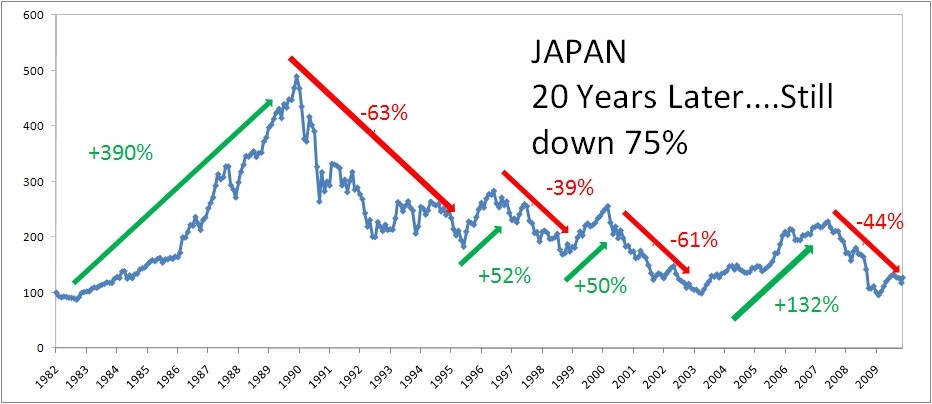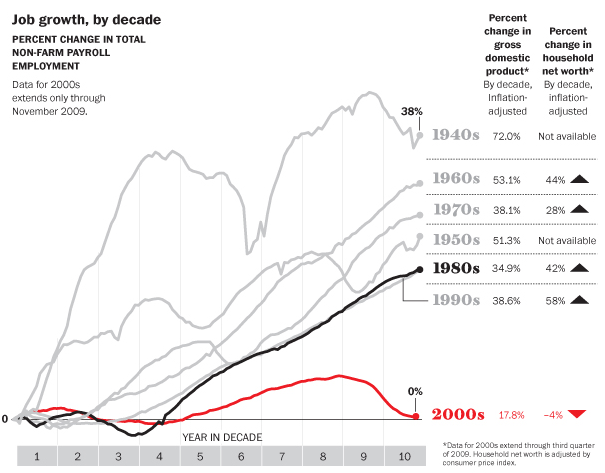The Lost Decade
Post on: 15 Октябрь, 2015 No Comment

Bookmark/Search this post
Well, now that the returns are in, we can declare this past decade, ‘the Aughts,’ to be a lost decade. There’s an important story contained in the data from the Aughts, and it exposes the foundations of our current economic crisis.
Forget about subprime mortgages and regulatory failures; those were merely stage props in a very large theatrical production. The plot line was the massive accumulation of credit across all sectors of society and an associated failure to save and invest.
Under the careless watch of Greenspan and then Bernanke, the total amount of debt in the US doubled from $26 trillion at the beginning of 2000 to $52 trillion at the end of 2009.
Imagine that you’d loaned your next-door neighbor $1 million in 2000. What would you have required in order to double your loans to him/her to $2 million over the next decade? I presume that you’d have wanted to know that your neighbor’s job was secure and their income growing.
Now consider that during the Aughts. for the first time in over six decades, the US saw zero net job creation, and, for the first time in the data series, saw falling median incomes.
There has been zero net job creation since December 1999. No previous decade going back to the 1940s had job growth of less than 20 percent. Economic output rose at its slowest rate of any decade since the 1930s as well.
Middle-income households made less in 2008, when adjusted for inflation, than they did in 1999 — and the number is sure to have declined further during a difficult 2009. The Aughts were the first decade of falling median incomes since figures were first compiled in the 1960s.
The last ten years saw a doubling of debt, combined with stagnant jobs and wages. Our debt doubled, but our means to pay it back remained utterly flat. This is all you really need to know to follow the main plot line of the crisis.
To continue our thought experiment from before, if the nation were your neighbor, would you have loaned them twice as much? Maybe not.
If you ever wondered how everybody seemed to be driving new cars and taking lavish vacations, the answer lies in the doubling of debt. The mystery of how it was possible to accumulate twice as many people working in government jobs as in manufacturing positions is solved by understanding that we simply paid for it all on a national credit card. In short, our standards of living were illusory, in that they were built on mountains of debt.
Which means that all the erstwhile efforts to ‘fix the credit markets’ so that we can get back to where we once were are not just misguided, they are harmful. We really shouldn’t try to recreate the conditions of the Aughts. They were unsustainable, had to end, and did.
Instead, we should be asking, Where do we want to go from here? We should take this opportunity to cut away those things that need to lopped off and divert our investments towards things that make sense for the future.

For example, the United States has badly over-‘invested’ in retail space and could certainly get by with a lot less of it. Therefore, efforts to ‘unlock the credit markets’ so that we can continue on our recent mall-building binge are stealing capital and talent away from the things we really need, like a modern and functional high-speed rail system.
Do we really want to default into a future that delivers 30 square feet of retail space per capita? How about 40? Does a shopper in the US really need more than six times as much retail shopping space as someone in Europe? How much is ‘too much?’
The heroic efforts to sustain that way of life could well have something to do with the fact that so many people have a sinking feeling in their stomachs that we are on the wrong track.
The challenge at any great turning point in history is recognizing that the landscape has fundamentally shifted. For my part, I am so certain that the Aughts cannot be recreated in letter or spirit that I am not at all interested in playing the stock market or fiddling around with bond funds, both of which are trading at levels that explicitly assume the Aughts are coming back.
They are not.
It’s a different future that awaits. Not necessarily worse, but certainly involving a whole lot less stuff bought on credit. Some will interpret this as a distressing decline in living standards, but for those who can shift their perception, this will be an exciting time of transformation from a culture of consumption to something far more satisfying and lasting.














